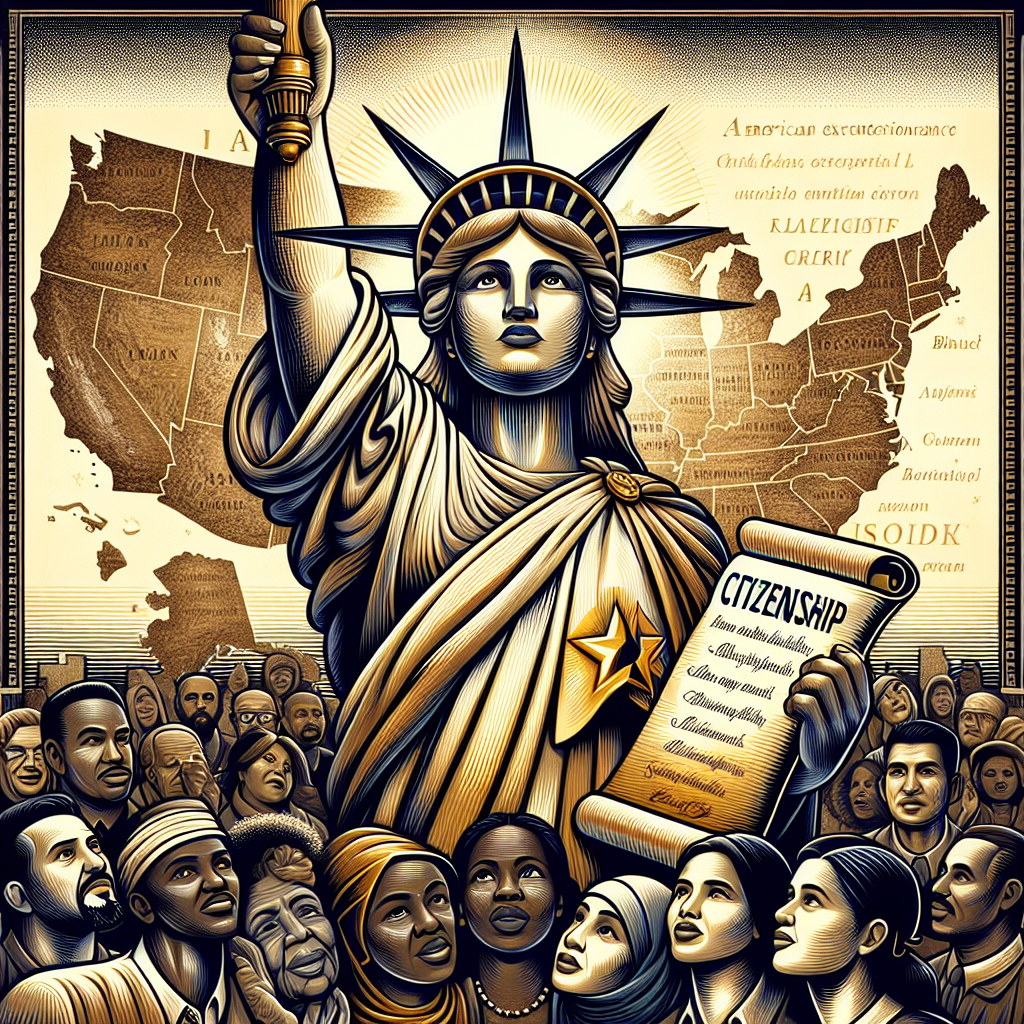Birthright citizenship, a principle enshrined in the 14th Amendment of the U.S. Constitution, has been a cornerstone of American identity since its ratification in 1868. This policy grants citizenship to anyone born on U.S. soil, regardless of the immigration status of their parents. However, in recent years, this long-standing tradition has come under scrutiny, particularly during the Trump administration, which sought to limit access to birthright citizenship through executive orders. This debate not only underscores the complexities of immigration policy but also raises questions about American exceptionalism and the values associated with it.
The Global Context of Birthright Citizenship
In examining the issue of birthright citizenship, it is essential to consider the global landscape. The United States is one of the few countries that uphold this principle without significant restrictions. Most nations have adopted alternative citizenship models, often focusing on the nationality of parents rather than the location of birth. This divergence places the U.S. in a unique position, prompting discussions about whether its approach aligns with contemporary global practices.
The Justice Department’s defense of limiting birthright citizenship suggests that aligning with global trends is a priority. However, this perspective overlooks the historical context of the 14th Amendment, which was designed to ensure equality and protect the rights of all individuals born in the U.S. Understanding the motivations behind various countries’ citizenship policies sheds light on the implications of changing the U.S. stance. For instance, many nations that do not grant citizenship at birth often have complex historical and social reasons for their policies, which can include colonial legacies or efforts to control immigration.
Legal Challenges and Political Implications
Since the introduction of Trump’s executive order limiting birthright citizenship, several legal challenges have arisen. Courts have consistently ruled against the administration’s attempts to alter this fundamental principle, highlighting a robust judicial resistance to changes that could undermine the rights of individuals born in the U.S. Most notably, the U.S. Court of Appeals for the 9th Circuit and the U.S. District Court for the District of New Hampshire have both found the order likely illegal. These rulings reflect a commitment to uphold the Constitution’s guarantees and emphasize the importance of maintaining established legal precedents.
The implications of these legal battles extend beyond the courts. They engage with broader discussions about American identity and values. The principle of birthright citizenship is often cited as a defining feature of American exceptionalism, reinforcing the idea that the U.S. is a nation built on the tenets of freedom and opportunity for all. As the debate continues, it becomes increasingly clear that any changes to this policy could have far-reaching consequences not only for individuals and families but also for the national narrative.
Table: Global Citizenship Policies
| Country | Birthright Citizenship |
|---|---|
| United States | Yes |
| Canada | Yes |
| Germany | No (with exceptions) |
| Japan | No |
As we analyze the ongoing legal and political discourse surrounding birthright citizenship, it is important to consider the election day implications that may arise from potential changes. The intersection of citizenship policy and electoral politics is a critical area of focus, especially as different factions advocate for varying approaches to immigration. Moreover, the challenges to the administration’s power, such as those presented in the challenge to administration's power, further illustrate the contentious nature of this issue and the broader implications for governance and civil rights.
The debate surrounding birthright citizenship in the United States is a complex and multifaceted issue that intertwines legal, historical, and sociopolitical dimensions. The core of this discussion revolves around the 14th Amendment, which enshrines the principle of citizenship by birth within U.S. territory. This principle has positioned the United States as a unique player on the global stage, prompting questions about the implications of potential changes to this longstanding policy.

Understanding Birthright Citizenship
Birthright citizenship, or jus soli, grants citizenship to individuals born on a nation’s soil, regardless of their parents’ nationality or immigration status. The United States has been one of the few countries to uphold this principle since the ratification of the 14th Amendment in 1868. In contrast, many other nations have adopted stricter criteria for citizenship, often prioritizing parental nationality over the birthplace of the child. This divergence raises critical questions about the American identity and the values associated with citizenship.
The historical context of birthright citizenship in the U.S. reveals a commitment to inclusivity that is often at odds with contemporary political rhetoric. Critics of birthright citizenship argue that it incentivizes illegal immigration and undermines national security. However, defenders assert that this policy is a testament to American exceptionalism, promoting equality and opportunity for all individuals born in the country. The legal challenges to policies restricting birthright citizenship reflect ongoing tensions between these competing viewpoints.
The Global Context of Citizenship Policies
As the Justice Department defends recent executive orders aimed at limiting birthright citizenship, it references a global trend towards more restrictive citizenship laws. However, this assertion lacks nuance when considering the historical and cultural factors that shape citizenship policies worldwide. Understanding which countries grant citizenship primarily based on the location of birth, and which don’t, helps make sense of the 127-year-old approach that the Justice Department is asking the court to reconsider. The major election law case currently before the courts exemplifies the legal complexities surrounding this issue, as it highlights the intersection of immigration policy and constitutional rights.
Moreover, the implications of altering birthright citizenship extend beyond legal frameworks; they resonate deeply within societal values. The United States has historically positioned itself as a beacon of hope and opportunity, attracting individuals from diverse backgrounds. A shift away from universal birthright citizenship could challenge this narrative, leading to broader ramifications for national identity and social cohesion. Legal experts often cite cases such as the supreme court intervention regarding immigration policies as pivotal moments that could redefine the landscape of citizenship in America.
Furthermore, the legal discourse surrounding birthright citizenship is not merely academic; it has real-world consequences for families and individuals. Trump’s birthright citizenship order, which denies U.S. citizenship to some children born in the United States based on the citizenship or immigration status of their parents, has faced legal challenges since shortly after the president signed it in January. Courts considering a new round of lawsuits have uniformly concluded that the executive order is likely illegal. This ongoing litigation underscores the critical nature of the issue and the potential for significant changes to the citizenship landscape in the U.S. As the courts navigate these complex legal waters, the outcomes will undoubtedly shape the future of American citizenship and its foundational principles.
Legal Challenges and Future Implications
The legal challenges to the Trump administration’s birthright citizenship order illustrate the contentious nature of this topic. Various courts have examined the implications of restricting citizenship based on parental status, and the consensus thus far indicates a strong likelihood of illegality. The immigration contractor appeal serves as a reminder that the judiciary plays a crucial role in interpreting constitutional rights, particularly in matters of citizenship and immigration.

These legal battles not only reflect the current political climate but also resonate with deeper historical narratives about immigration and citizenship in America. The potential for a redefined approach to birthright citizenship raises questions about the core values that define the nation. As debates continue, the impact on immigrant communities and national identity will be profound, potentially reshaping the very fabric of American society.
The debate surrounding birthright citizenship in the United States is deeply intertwined with notions of American exceptionalism. This complex issue raises questions about the identity of the nation and its foundational ideals. As discussions continue, it becomes evident that the implications of altering birthright citizenship extend far beyond legal frameworks, impacting social and cultural landscapes as well.
American Exceptionalism and Birthright Citizenship
American exceptionalism posits that the United States holds a unique position among nations, characterized by its democratic values and commitment to individual rights. This belief has historically influenced U.S. immigration policy, particularly regarding the 14th Amendment, which guarantees citizenship to anyone born on American soil. Critics argue that this principle embodies the nation’s commitment to inclusivity and diversity, reflecting a broader understanding of human rights.
However, the rise of nationalist sentiments has prompted some to challenge the traditional interpretation of birthright citizenship. Proponents of reform often cite a desire to align U.S. policy with global trends, where many countries do not grant citizenship based solely on birthplace. This shift raises concerns about the potential erosion of American ideals, as the nation has long been viewed as a beacon of hope for those seeking a better life.
As legal battles unfold, the implications of redefining birthright citizenship remain significant. The Justice Department’s position, which seeks to limit citizenship based on parental status, could fundamentally alter the landscape of American identity. Such changes might not only affect individuals born in the U.S. but could also reshape the narrative of what it means to be an American.

Legal Challenges and Societal Impact
The legal challenges to President Trump’s executive order limiting birthright citizenship reveal the contentious nature of this issue. Courts have consistently ruled against the administration’s attempts to change the long-standing interpretation of the 14th Amendment, suggesting that the order is likely illegal. This legal resistance underscores the importance of maintaining established norms that support inclusivity.
Moreover, the societal implications of limiting birthright citizenship are profound. Families potentially affected by these changes may face uncertainty and fear regarding their children’s futures. This situation not only impacts individuals but also has broader ramifications for community cohesion and social stability. As the nation grapples with these issues, the question of citizenship is at the forefront of a larger dialogue about identity and belonging.
In light of this ongoing debate, it is crucial to consider the historical context of citizenship laws in the U.S. Understanding the evolution of these laws can shed light on current challenges and inform future discussions. For instance, examining the legal protections for contractors highlights how legal frameworks can evolve in response to changing societal values and needs.
The Future of Birthright Citizenship
Looking ahead, the future of birthright citizenship in the United States remains uncertain. As public opinion shifts and political landscapes change, the question of citizenship will likely continue to be a focal point of national discourse. Lawmakers and advocates will need to navigate the complexities of this issue, balancing the need for security with the foundational principles of equality and justice.
The ongoing legal battles serve as a reminder of the resilience of American democratic ideals. Regardless of the outcome, the discussions surrounding birthright citizenship will undoubtedly shape the narrative of what it means to be an American in the 21st century. As the nation reflects on its values, the principles of inclusivity and diversity must remain at the forefront of any proposed changes to citizenship laws.